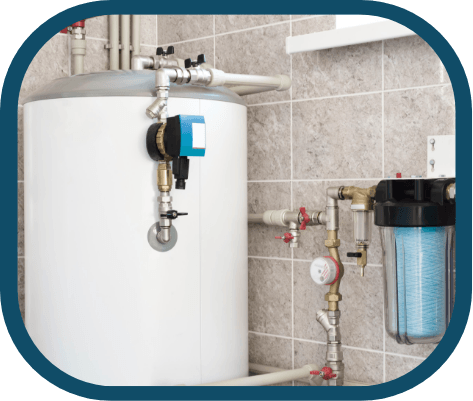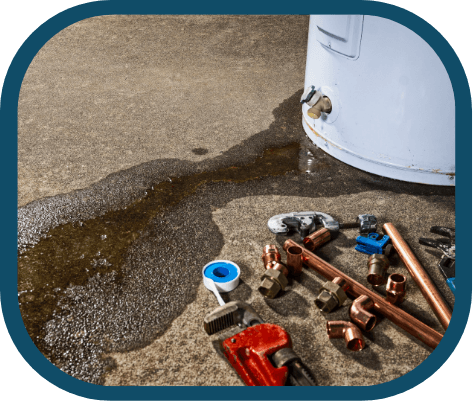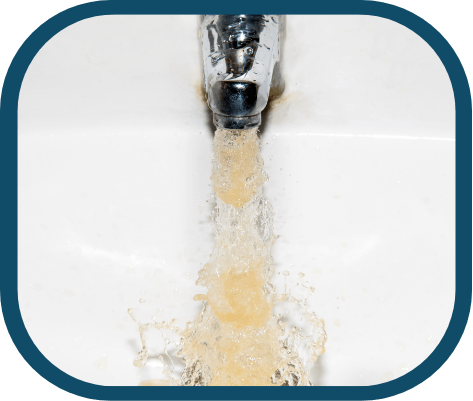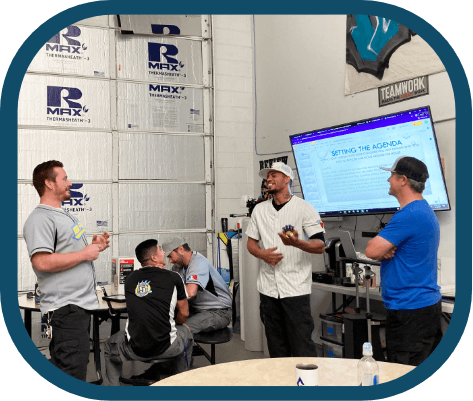
Our business was built on the core values of honesty, integrity, quality, and exceptional service at fair pricing. These values have allowed us to employ the best of the best in the field, and provide ongoing training for employees in order to keep their skills sharp.
We also install and replace water heaters in:
When Water Heater Repairs Are Needed, We Are There
Not all problems mean your water heater needs to be replaced. With repairs from a skilled Denver water heater plumber, you can usually get your unit up and running again before you know it. At High 5 Plumbing, we will consider the size of the problem and the age of your water heater, in order to make an honest assessment regarding your unique situation.
Water Heater issues you should be looking out for include:
Anode Rod Failure
This metal rod is normally made of aluminum or magnesium and remains as a point of contact with the water in your tank. This is so that it can attract the irons that would normally cause rust. After extended use, these rods will eventually become worn out and need to be replaced. If you do not replace them, you could experience major problems with your water heater very quickly, not to mention finding that reddish-brown color in your water.
Sediment Build-Up
If you notice strange popping, banging, or clanging noises coming from your unit, this could be an indicator that sediment has built up in your tank, and is causing a reaction with the heating element. Running out of hot water quickly is another sign of sediment build-up, because the sediment is taking up more space in the tank, so your water therefore takes longer to heat. To fix this problem, you will likely need to flush out the tank.
A Broken Dip Tube
The dip tube is used to vent all of the fresh water from the water line to the bottom of your tank so that it can warm faster. If you find that cold water is coming out of your faucet even when you are turning the hot knob, it is likely that your dip tube is broken.
Excessive Condensation/Leaking
Look out for excessive condensation or water that is pooling around your water heater tank, as this usually means you have a leak and your unit needs to be repaired ASAP. If left unchecked, a water heater leak will cause extensive water damage, and may force you to replace your system entirely.
Bacteria Build-Up
If your water has a smell that is reminiscent of rotten eggs, this could be due to a build-up of sulfur bacteria in your water heater. This is another problem that can usually be resolved by draining and cleaning your water heater tank.
Incorrect Thermocouple Readings
If your water heater’s thermocouple says your water is warm, but your water feels cold, you will need to replace this part. You cannot get your pilot light to work without a functioning thermocouple.
A Pilot Light That Has Gone Out
If you are not getting any hot water at all, and you use a gas water heater rather than a system with an electric heating element, there is a good chance your pilot light has gone out. This could be because of a problem with your thermocouple, a lack of combustible air, or simply a strong breeze. Regardless of what the issue is, however, your water heater will not be able to function until the pilot light is re-lit.
How to Tell if You Have a Leak in Your Water Heater
Leaks in your water heater can waste thousands of gallons of water and cause damage to your home. It can also encourage mold to grow in your home. Unfortunately, most homeowners don’t realize that there is something wrong with their water heater, until it’s too late. Regular inspection and maintenance is a must to ensure that your water heater stays in good shape.
#1: Puddle of Water on the Floor by the Water Heater
The bottom of the tank is always the best place to start. Check the drain valve and T&P valve. Then, inspect the pressure relief valve near the top of the tank, pipes, tubes, and the entry points where they meet the tank. Because of the high pressure, the tubes entering the tank are vulnerable to leaks. If there is no apparent sign of leak, try checking nearby appliances. They could form condensation, which can accumulate and drip to the floor.

#2: Strange Noises Coming from the Water Heater
If you suspect that you have a water heater leak, stand beside your water heater and try to listen very carefully. If you hear a rumbling or strange noise from the tank as it heats up, this may be indicative of sediment build up.
Sediments accumulate at the bottom of your water heater. Over time the hardened particles will cause the metal to become brittle and develop some cracks and small holes.
#3: Rust-Colored Water in Your Home
To rule out rusty water caused by iron pipes, try turning on a cold water tap anywhere. If the water is discolored, the pipes may be the culprit. But if clear water comes from it, that means your water heater is about to fail and may need to be replaced soon.

Why Is My Hot Water Heater Leaking?
Inlet and Outlet Connections
All valves or connections are susceptible to leaks over time either because they have worn down or they have loosened. The inlet connection is used to flow cold water into the water heater, then after the water heats, it exits as hot water through the outlet connection.
If these connections are the source of your leak, then you shouldn’t have any problems resolving the issue yourself:
- Check both connections to be sure of where the leak is occurring
- Then tighten the connection with a wrench
If you have a faulty pipe, you’ll need to replace it. You should be able to do this on your own as well, but if you have any issues, then call a professional plumber.
Temperature and Pressure Relief Valve
Every water heater has a valve called the temperature and pressure relief valve. This device is mandatory and is in place to prevent too much pressure from building in the water heater. If there is too much pressure in the tank or the water exceeds the set temperature, then you might see water running down the side of the tank from the valve.
This water could be a sign of two things:
- You have a broken valve
- Your tank has too much pressure
If you notice water leaking from this valve it’s best to call a professional rather than trying to fix it yourself as it could lead to more significant problems.
Corrosion
As water filters through your water heater, sediment and minerals from the water collect and settle at the bottom of the tank. All of this buildup eventually causes corrosion on the bottom of your water heater which can form a leak from the bottom of the water heater over time.
While this is one of the most common causes of water heater leaks, you can prevent them by flushing your tank once every six to 12 months. This will prevent too much sediment from building up at one time.
How Do You Stop a Hot Water Heater From Leaking?
Water heater leaks can be intimidating, but don’t worry we have provided you with helpful steps above to guide you on how you can fix it yourself. If at any point the problem escalates, then don’t hesitate to call the water heater experts at High 5 Plumbing.
We always make our customers our priority, and we understand how vital water heaters are to your everyday life, so we will do everything we can to get yours up and running again!
How Do I Get the Most Out of My Water Heater?
Fortunately, many water heater problems can be detected early by regularly inspecting your unit and keeping an eye out for certain signs and symptoms. By calling High 5 Plumbing for Denver water heater maintenance, you can get regular inspections and tune-ups designed to save you money in the long run.

Let our technicians perform a comprehensive inspection of your unit, and avoid unnecessary repairs and replacements for years!
24/7 Emergency Water Heater Repairs in Denver
Our team is even available 24/7 for emergency repairs through our High 5 Club, so your needs are always met. And with multiple coupons and financing options, our certified plumbing pros can help your family to enjoy the best value possible for any budget. Call now for water heater repairs in Denver, and experience the High 5 Plumbing difference for yourself.
FAQs
How frequently should I schedule maintenance for my water heater?
We recommend scheduling annual maintenance to ensure optimal performance and catch any potential issues early on.
What is the typical lifespan of a water heater?
The lifespan of a water heater varies, but generally, traditional tank water heaters last around 8 to 12 years, while tankless water heaters can last up to 20 years with proper care.
Why do water heaters sometimes make unusual noises?
Unusual noises like popping or rumbling may indicate sediment buildup in the tank, which can interfere with heating efficiency. Flushing the tank can often resolve this issue.
What should I do if I discover a leak in my water heater?
If you notice a leak, it’s crucial to turn off the power or gas supply to the water heater and shut off the water supply valve. Then, contact a professional plumber for prompt diagnosis and repair.
How can I improve the efficiency of my water heater?
To enhance efficiency, consider lowering the thermostat setting, insulating hot water pipes, draining the tank periodically to remove sediment buildup, and promptly repairing any leaks.
Is rusty water from my water heater a cause for concern?
Rusty or discolored water could indicate corrosion inside the tank or rusty plumbing pipes. Flushing the tank and inspecting the plumbing system can help determine the source of the issue.
What should I do if I frequently run out of hot water?
Frequent hot water shortages could be due to factors such as a small tank size, sediment buildup, or a malfunctioning heating element. Consulting with a plumber can help identify and resolve the problem.
Is it safe for me to attempt repairs on my water heater myself?
While some minor maintenance tasks can be performed by homeowners, such as flushing the tank or checking for leaks, it’s generally recommended to hire a professional plumber for repairs to ensure safety and proper diagnosis of issues.
How can I determine if my water heater needs to be replaced?
Signs that may indicate the need for water heater replacement include frequent breakdowns, old age (typically over 10-15 years for tank water heaters), and significant corrosion or leaks.
What factors should I consider when selecting a new water heater?
When choosing a new water heater, factors to consider include household size, hot water usage patterns, energy efficiency ratings, fuel type (electric, gas, or propane), upfront cost, and long-term operating costs.

